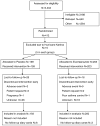Efficacy of esomeprazole for treatment of poorly controlled asthma
- PMID: 19357404
- PMCID: PMC2974569
- DOI: 10.1056/NEJMoa0806290
Efficacy of esomeprazole for treatment of poorly controlled asthma
Abstract
Background: Gastroesophageal reflux is common among patients with asthma but often causes mild or no symptoms. It is not known whether treatment of gastroesophageal reflux with proton-pump inhibitors in patients who have poorly controlled asthma without symptoms of gastroesophageal reflux can substantially improve asthma control.
Methods: In a parallel-group, double-blind trial, we randomly assigned 412 participants with inadequately controlled asthma, despite treatment with inhaled corticosteroids, and with minimal or no symptoms of gastroesophageal reflux to receive either 40 mg of esomeprazole twice a day or matching placebo. Participants were followed for 24 weeks with the use of daily asthma diaries, spirometry performed once every 4 weeks, and questionnaires that asked about asthma symptoms. We used ambulatory pH monitoring to ascertain the presence or absence of gastroesophageal reflux in the participants. The primary outcome was the rate of episodes of poor asthma control, as assessed on the basis of entries in asthma diaries.
Results: Episodes of poor asthma control occurred with similar frequency in the placebo and esomeprazole groups (2.3 and 2.5 events per person-year, respectively; P=0.66). There was no treatment effect with respect to individual components of the episodes of poor asthma control or with respect to secondary outcomes, including pulmonary function, airway reactivity, asthma control, symptom scores, nocturnal awakening, or quality of life. The presence of gastroesophageal reflux, which was documented by pH monitoring in 40% of participants with minimal or no symptoms, did not identify a subgroup of patients that benefited from treatment with proton-pump inhibitors. There were fewer serious adverse events among patients receiving esomeprazole than among those receiving placebo (11 vs. 17).
Conclusions: Despite a high prevalence of asymptomatic gastroesophageal reflux among patients with poorly controlled asthma, treatment with proton-pump inhibitors does not improve asthma control. Asymptomatic gastroesophageal reflux is not a likely cause of poorly controlled asthma. (ClinicalTrials.gov number, NCT00069823.)
2009 Massachusetts Medical Society
Comment in
-
Silent acid reflux and asthma control.N Engl J Med. 2009 Apr 9;360(15):1551-3. doi: 10.1056/NEJMe0900117. N Engl J Med. 2009. PMID: 19357411 No abstract available.
-
Esomeprazole for asthma.N Engl J Med. 2009 Jul 9;361(2):206; author reply 207-8. doi: 10.1056/NEJMc090990. N Engl J Med. 2009. PMID: 19587349 No abstract available.
-
Esomeprazole for asthma.N Engl J Med. 2009 Jul 9;361(2):206-7; author reply 207-8. N Engl J Med. 2009. PMID: 19593855 No abstract available.
-
Esomeprazole for asthma.N Engl J Med. 2009 Jul 9;361(2):207; author reply 207-8. N Engl J Med. 2009. PMID: 19593856 No abstract available.
-
ACP Journal Club. Esomeprazole did not improve asthma symptoms in poorly controlled asthma.Ann Intern Med. 2009 Aug 18;151(4):JC2-10. doi: 10.7326/0003-4819-151-4-200908180-02010. Ann Intern Med. 2009. PMID: 19687484 No abstract available.
-
Antireflux therapy in asthma: is there any role?Gastroenterology. 2009 Nov;137(5):1844-6. doi: 10.1053/j.gastro.2009.09.036. Epub 2009 Sep 27. Gastroenterology. 2009. PMID: 19789079 No abstract available.
References
-
- Field SK, Underwood M, Brant R, Cowie RL. Prevalence of gastroesophageal reflux symptoms in asthma. Chest. 1996;109:316–22. - PubMed
-
- Harding SM, Guzzo MR, Richter JE. 24-h esophageal pH testing in asthmatics: respiratory symptom correlation with esophageal acid events. Chest. 1999;115:654–9. - PubMed
-
- Sontag SJ, O'Connell S, Khandelwal S, et al. Most asthmatics have gastroesophageal reflux with or without bronchodilator therapy. Gastroenterology. 1990;99:613–20. - PubMed
-
- Vincent D, Cohen-Jonathan AM, Leport J, et al. Gastro-oesophageal reflux prevalence and relationship with bronchial reactivity in asthma. Eur Respir J. 1997;10:2255–9. - PubMed
-
- Simpson W. Gastroesophageal reflux disease and asthma. Arch Intern Med. 1995;155:798–803. - PubMed
Publication types
MeSH terms
Substances
Associated data
Grants and funding
LinkOut - more resources
Full Text Sources
Other Literature Sources
Medical

